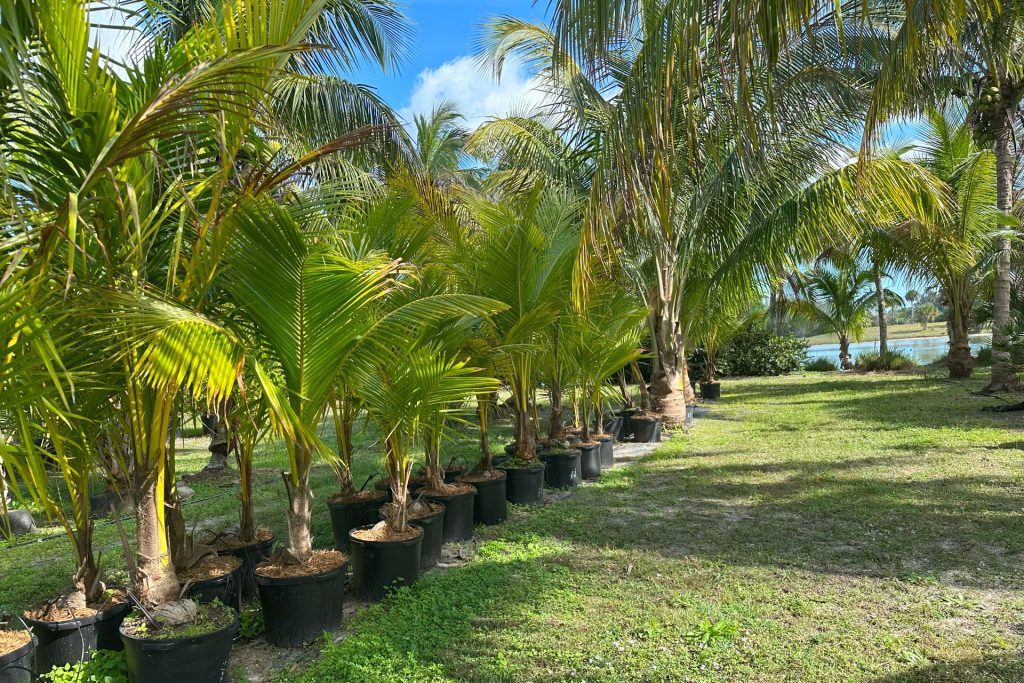
Key Questions to Ask When Choosing a Palm Tree
Adding palm trees to your property can instantly elevate its aesthetic interest, creating a tropical atmosphere and increasing curb appeal. However, choosing the right palm tree isn’t as simple as picking the one that looks best. To ensure your investment thrives in your space, there are several important factors to consider. Here are key questions to ask before buying a palm tree to make the best decision for your landscape.
1. What Type of Palm Tree is Best for My Area?
Palm trees come in a wide range of species, each with unique needs and growth habits. Some thrive in sandy, coastal areas, while others prefer more shaded or humid environments. Ask about the species that are best suited to your region’s climate. For example, if you live in south or coastal Florida, options like the Coconut Palm, Sylvester, or Bismarckia Palm are popular and hardy. Understanding the tree’s climate tolerance ensures it will flourish where you plant it.
2. How Big Will the Palm Tree Grow?
Size is an essential factor when choosing a palm tree. Some species, like the Pygmy Date Palm, remain relatively short, making them ideal for tight spaces or accent landscaping. Others, like the towering Bismarckia or Sylvester Palm, can grow over 50 feet tall. Ask about the mature height and spread of the palm to ensure it fits the scale of your property and doesn’t interfere with nearby structures, utility lines, or other plants.
3. What Are the Maintenance Requirements?
Not all palm trees require the same level of care. Some, like the Queen Palm, may need regular pruning to remove dead fronds, while others, like the Bismarckia Palm, are low-maintenance. Ask about watering, fertilizing, pruning, and pest control needs to understand the level of effort required to keep the tree healthy. Knowing this in advance will help you choose a palm that aligns with your time and resources.
4. How Long Does a Palm Tree Take to Grow?
Palm trees vary significantly in growth rates. If you’re looking to make an immediate impact on your landscape, consider fast-growing species like the Coconut Palm. For a slower-growing, long-term statement piece, species like the Beccariophoenix Alfredii Palm may be more appropriate. Ask whether the tree is sold fully grown, as a sapling, or somewhere in between, and how long it will take to reach its mature size.
5. Do Palm Trees Have Any Special Soil or Sunlight Needs?
Soil and sunlight play a major role in a palm tree’s success. While many palms are adaptable to various soil types, some prefer sandy, well-draining soils, while others can tolerate clay or loam. Additionally, most palms thrive in full sun, but some, like the Lady Palm, do better in partial shade. Ask about the tree’s specific needs to ensure your site conditions match its requirements.
6. Is the Palm Tree Resistant to Pests and Diseases?
Certain palm trees are more susceptible to pests like spider mites, scale, or diseases such as lethal yellowing. Ask whether the species you’re considering has any known vulnerabilities and what steps you can take to protect it. If you’re looking for a low-maintenance option, choose pest-resistant varieties to reduce the likelihood of issues.
7. What Are the Costs Involved with Palm Trees?
Beyond the initial purchase price of the tree, consider additional costs like delivery, planting, and maintenance. Ask whether the nursery offers services such as professional planting or if they provide aftercare tips. A well-planted palm tree is more likely to thrive, so understanding the full cost upfront can save you time and money in the long run.
8. Is the Palm Tree Grown Locally or Imported?
Locally grown palm trees are often better acclimated to the area’s climate and soil conditions, making them more likely to thrive. Imported palms, while sometimes more exotic, may face greater challenges adjusting to your environment. Ask where the tree was grown and how it was transported to ensure it will transition well to your property.
9. What Is the Lifespan of a Palm Tree?
Some palm trees can live for decades, while others have shorter lifespans. Ask about the expected longevity of the species you’re considering to ensure it aligns with your landscaping goals. If you’re looking for a permanent fixture in your yard, choose a hardy, long-lived species.
10. Does the Nursery Offer a Guarantee or Support?
Finally, ask if the nursery provides any type of guarantee or support for their palm trees. Many reputable sellers offer warranties that cover the tree’s health for a certain period after purchase. Additionally, inquire if they provide guidance on planting, care, and troubleshooting should you encounter any issues.
Choosing the Right Palm Tree
Choosing the right palm tree involves more than aesthetics—it requires understanding the tree’s needs, growth potential, and compatibility with your environment. By asking these key questions before buying a palm tree, you can make an informed decision with a tree that can thrive for years to come.
Ready to find the perfect palm for your space? Visit our tree farm to explore our wide selection and speak with our knowledgeable team. We’re here to help you create the tropical paradise you’ve always dreamed of!
